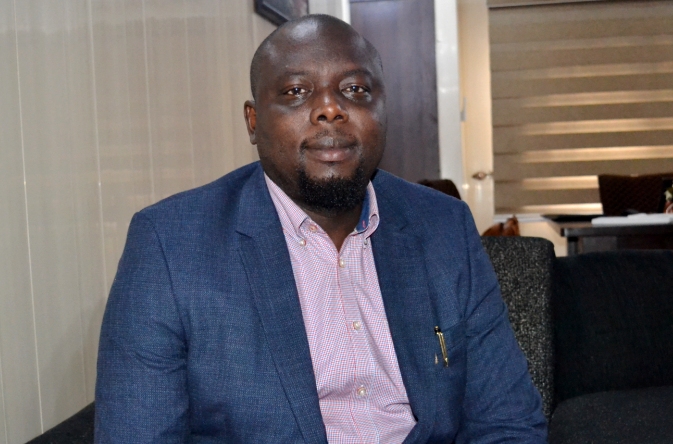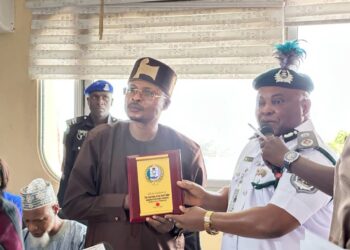Mr Emmanuel Maiguwa is President of the Maritime Security Providers Association of Nigeria and President, Alumni of Maritime Academy of Nigeria, Oron. He spoke recently with Oluyinka Onigbinde on the sidelines of an event organised by Maritime Reporters’ Association of Nigeria, to discuss threat to maritime security in Nigeria

What do you think are the threats to Maritime industry in Nigeria?
Maritime security has a lot of threats and activities that constitute insecurity. We have outlying, we have piracy, we have theft, we have armed robbery, we have illicit drugs and arms trafficking. We also have unregulated fishing activities. These are all threats that actually constitute nuisance and difficulties to the advancement of shipping. Even though we have paid so much attention to the issue of piracy, it doesn’t mean piracy is the top on the list of threats that affect our industry. So we have a lot of them.
It seems you as well as many other stakeholders who have spoken are not giving a very good pass mark on the Deep Blue Project assets. How do you react to the issue of the effectiveness of the Deep Blue Project assets by NIMASA?
Yeah, I think likely because the Deep Blue asset is actually a response mechanism. So perhaps those who conceive the idea of establishing the Deep Blue assets are people who believe that the challenge that we have is the response capability. So the Deep Blue actually puts response capabilities to respond to issues of maritime threats as they happen at sea. But before they get to sea, they actually get initiated from the shore side. You have a lot of issues in our ports, issues of stowaways, issues of drugs coming into our country, issues of theft and so on and so forth. So I don’t think the Deep Blue asset response strategy will address those issues. Like I have said, first we need a framework. We also need a dedicated agency with the capacity. I am talking about an agency with experience and understand shipping. The industry interfaces with international shipping and we cannot just be doing it carelessly without considering how it affects international shipping. So yes, we have a couple of frameworks like I have identified that would deal with one or two of the threats, even though mostly insufficient. Suppression of Piracy and Other Maritime Offences Act (SPOMO) Act can be a platform. But the SPOMO Act itself again is insufficient in addressing all the crimes. So the way forward is to revise the SPOMO Act to identify all the maritime security threats that we have in Nigeria. We should also have a dedicated agency that will be responsible for maritime security. Not the way it is happening where every agency is dealing with it. Some of the agencies don’t even understand how to respond to issues in the maritime industry, especially the National Drug Law Enforcement Agency (NDLEA) who has no clue about the maritime industry and how to respond to crimes that happen in the sea. So we have this dedicated agency with the financial resources needed to be able to put the assets. The Deep Blue Sea asset for me, it’s like putting the cart before the horse. It’s not yet effective. We can’t even identify it. We have the issue of identification in our waters. We cannot properly identify the population of our maritime environment. And I’m not talking about human population. I’m talking about assets. I’m talking about companies. I’m talking about boats when they go to sea. How do we see them? We see them sometimes and you cannot really identify who owns what. So we have not delineated our seas. Every boat has the capacity to go anywhere. A small boat of about seven to five meters, a fiber boat, an open boat can go to sea up to 50 nautical miles. This should not be allowed, because you cannot identify that kind of boat. Better countries limit those vessels according to their capacity, capabilities, and safety features.
You also made reference to the Nigerian ship registry where you mentioned that there are some ships, if registered in Nigeria; they won’t be allowed to operate.
The Nigerian ship registry is counter-productive. No serious person who wants to do business internationally will register a vessel under the Nigerian ship registry without reforming the ship registry. If you do that, then you limit your vessel to trading in Nigeria. Then Nigeria cannot guarantee that your vessel will be trading every day. So as a businessman, you struggle, and when you struggle, everyone along the value chain of ship struggles and that involves suppliers, builders, repairers, seafarers, and traders. Everyone struggles because you are struggling as a ship owner. The ship is the lady that brings about businesses and shipping services. Without the ship, there is no business completely.
So what do you think the government can do because the NIMASA DG has said that they are doing their best in ensuring that the ship registry is up and running?
I think government should put people who are fit to do the job. That’s number one; from policy to implementation. If you don’t have people who are fit to do the job, then it is impossible for them to be able to do that. See, I’m not talking about someone with educational background. You have a problem in the farm. Who do you want to solve the problem? It is a farmer, an active farmer, not someone who has farmed before. So you need to be able to do this. A serious country will look at a serious industry like the maritime industry to be able to put capable people in and give them a mandate. If that is done, perhaps we’ll be able to sit down and begin to articulate the policies and taking steps to correct the challenges that they are having.
One of the speakers did mention that we have many students of the Maritime Academy of Nigeria leaving school without jobs to do and all of that. As an alumnus, what do you think can be done, particularly in this area?
Like I said, it all starts with the ship, which is ship with employment. So without ship with employment, no one is going to get any job. Whether you train a seafarer or you train a manager in Maritime Academy, he is not going to be successful. So we have to start to find a way to guarantee employment for Nigerian ship owners, not just acquisition of ships. There has to be also be employment.
What would be your advice to the Minister of Marine and Blue Economy?
I think my advice to the Minister of Marine and Blue Economy is first, he needs to communicate to the industry the structure of the Marine and Blue Economy. He needs to communicate to us the blueprint that he intends to use. He also needs to work with credible people that will support his mission and agenda. We have seen situations where foreign persons have been brought to design the policies of our industry. And I would want to caution on that because this is a critical industry with national security interests. We need to pay more attention to international competition and elements of international competition. For me, that is not to say that there are no good people who can design policies for Marine and Blue Economy. I have laid my hands on several documents that would work perfectly. There are better educated or enlightened people that will be able to deliver on that role that we are giving out to foreigners to do. And the rhetoric of quickly jumping into launching the Nigerian National Shipping Carrier without really discussing the issues that are on ground on manpower, policies, as well as the issue of getting employment for the vessels, is a problem.
The Cabotage Act has worked against the country and for me I would say the Local Content Act is doing more than what the Cabotage Act is doing. So it is high time we looked into participating in international shipping as a country, so we can take advantage of our presence as a littoral state.















